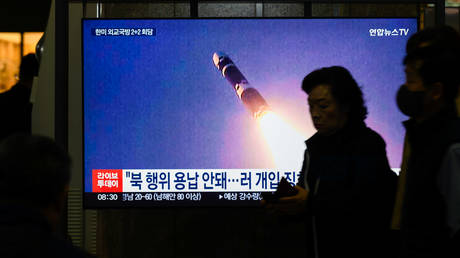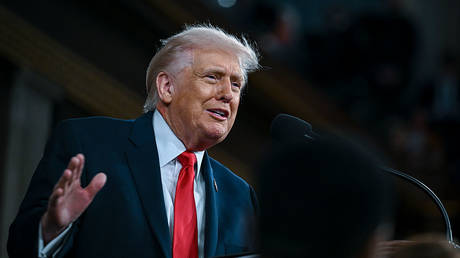
Other nations will have no choice but to bolster their deterrence, Pyongyang has warned
US President Donald Trump’s plans for a new “Golden Dome” anti-ballistic missile defense system will fuel a nuclear arms race, North Korea has said.
Unveiled by Trump last week, the initiative would provide a multilayered shield against long-range threats to the US. Some interceptor weapons would be deployed in space, and the system would reportedly include the capacity to strike launch sites before a missile is fired. The Congressional Budget Office has estimated project could cost more than $542 billion over a 20-year period.
North Korea reiterated its objections in a memorandum released by the Foreign Ministry’s Institute for American Studies, describing the Golden Dome as an inherently offensive system and a “malignant factor” fueling a global strategic arms race. The findings were reported by state media on Tuesday.
The memorandum accused Washington of attempting to militarize space, meaning nations not aligned with the US would be forced to pursue symmetrical nuclear capabilities as their only means of self-defense. It also warned that US “satellite states,” including South Korea and Japan, could be drawn into American military strategy and serve as “cannon fodder” in future conflicts.
The project is “a typical product of ‘America first’, the height of self-righteousness, arrogance, high-handed and arbitrary practice, and is an outer space nuclear war scenario supporting the US strategy for uni-polar domination,” the state-run Korean Central News Agency said.
Last week, Kremlin spokesman Dmitry Peskov said all nations have the sovereign right to develop means of countering perceived threats, when asked specifically about the Golden Dome. However, Moscow has consistently opposed the militarization of space and actions it views as destabilizing to the global strategic balance.
President Vladimir Putin, speaking at his annual press conference last December, underscored Russia’s efforts to ensure that its nuclear-capable weapons could defeat all possible countermeasures. He argued that decades of American investment in anti-ballistic missile infrastructure “cost a lot to taxpayers and contribute little to the security for their country.”




